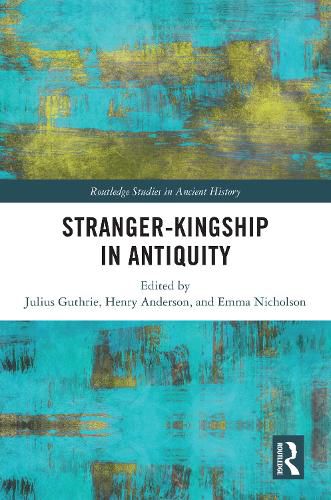Readings Newsletter
Become a Readings Member to make your shopping experience even easier.
Sign in or sign up for free!
You’re not far away from qualifying for FREE standard shipping within Australia
You’ve qualified for FREE standard shipping within Australia
The cart is loading…






This volume introduces the notion of "stranger-kingship" to the field of ancient history and evaluates its use as a new way of thinking about kingship as a political, social, and cultural phenomenon.
The chapters highlight the clear and widespread value of the "stranger-king" as a new approach for understanding patterns of political life across time and space in antiquity. The volume begins with theoretical discussions of the "stranger king" and explores how the theory can be mapped onto current thinking about kingship in both Greece and Rome. The chapters then show the multifaceted ways in which this theory can be applied, testing some of its core ideas through case studies that cover Hellenistic monarchy, Greek and Roman kings, the Ptolemies of Egypt, Late Antique Roman emperors, and Ostrogothic Italy and Visigothic Iberia. The volume demonstrates that stranger-kingship has much to offer studies of ancient kingship as a heuristic tool, providing avenues for future research.
Stranger-Kingship in Antiquity provides a fascinating cross-cultural study of "stranger kings", of interest to students and scholars in classical studies and the history of the ancient Mediterranean world.
$9.00 standard shipping within Australia
FREE standard shipping within Australia for orders over $100.00
Express & International shipping calculated at checkout
Stock availability can be subject to change without notice. We recommend calling the shop or contacting our online team to check availability of low stock items. Please see our Shopping Online page for more details.
This volume introduces the notion of "stranger-kingship" to the field of ancient history and evaluates its use as a new way of thinking about kingship as a political, social, and cultural phenomenon.
The chapters highlight the clear and widespread value of the "stranger-king" as a new approach for understanding patterns of political life across time and space in antiquity. The volume begins with theoretical discussions of the "stranger king" and explores how the theory can be mapped onto current thinking about kingship in both Greece and Rome. The chapters then show the multifaceted ways in which this theory can be applied, testing some of its core ideas through case studies that cover Hellenistic monarchy, Greek and Roman kings, the Ptolemies of Egypt, Late Antique Roman emperors, and Ostrogothic Italy and Visigothic Iberia. The volume demonstrates that stranger-kingship has much to offer studies of ancient kingship as a heuristic tool, providing avenues for future research.
Stranger-Kingship in Antiquity provides a fascinating cross-cultural study of "stranger kings", of interest to students and scholars in classical studies and the history of the ancient Mediterranean world.